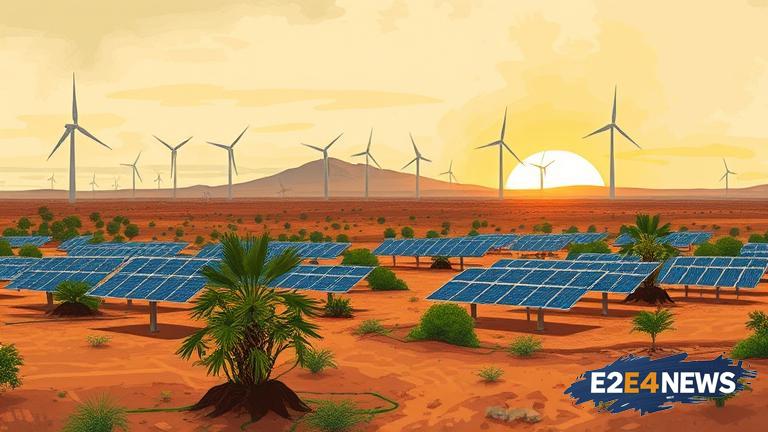The African continent is witnessing a significant shift towards renewable energy, driven by the need to address the pressing issues of energy access, energy security, and climate change. With a growing population and increasing economic activities, the demand for energy is on the rise, and renewable energy is emerging as a viable solution. Solar and wind power are the most prominent forms of renewable energy in Africa, with countries like South Africa, Morocco, and Egypt leading the way. The cost of renewable energy is decreasing, making it more competitive with fossil fuels, and governments are implementing policies to support the development of renewable energy projects. The African Union’s Agenda 2063 and the United Nations’ Sustainable Development Goals (SDGs) are also driving the adoption of renewable energy in Africa. Renewable energy can help reduce greenhouse gas emissions, improve air quality, and enhance energy security, which are critical for sustainable development. Moreover, renewable energy can create jobs, stimulate local economies, and improve the overall quality of life. However, the transition to renewable energy also poses challenges, including the need for significant investment, infrastructure development, and technology transfer. To address these challenges, international cooperation, knowledge sharing, and capacity building are essential. The private sector is also playing a crucial role in the development of renewable energy in Africa, with companies investing in solar and wind farms, and providing innovative financing solutions. Furthermore, renewable energy can help address the issue of energy access, which is a major challenge in many African countries. Off-grid renewable energy solutions, such as solar home systems and mini-grids, are being implemented to provide energy access to remote and underserved communities. In addition, renewable energy can help reduce the burden on traditional energy sources, such as biomass and fossil fuels, which are often associated with negative environmental and health impacts. The use of renewable energy can also enhance energy efficiency, reduce energy losses, and improve the overall energy mix. Moreover, renewable energy can help promote economic development, improve food security, and enhance human health and well-being. The development of renewable energy in Africa requires a coordinated approach, involving governments, private sector companies, civil society organizations, and international partners. It also requires the development of supportive policies, regulations, and incentives to encourage investment in renewable energy. Additionally, the development of renewable energy in Africa needs to be integrated into national and regional development plans, and aligned with global sustainability goals. The future of renewable energy in Africa looks promising, with many countries setting ambitious targets to increase their share of renewable energy in the energy mix. However, to achieve these targets, significant efforts are needed to address the challenges and barriers that hinder the development of renewable energy in Africa. Overall, the transition to renewable energy in Africa has the potential to transform the continent’s energy landscape, promote sustainable development, and improve the lives of millions of people.
